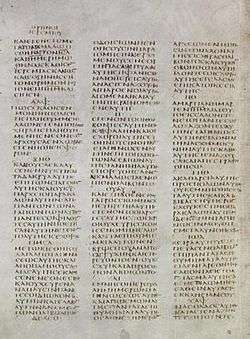Lamentations 1
| Lamentations 1 | |
|---|---|
 Lamentations 1:1 - 1:11 on the first page of Book of Lamentations in Codex Sinaiticus (AD 330-350). | |
| Book | Book of Lamentations |
| Bible part | Old Testament |
| Order in the Bible part | 25 |
| Category | Ketuvim |
Lamentations 1 is the first chapter of the Book of Lamentations in the Hebrew Bible or the Old Testament of the Christian Bible.[1][2] This book contains the elegies of prophet Jeremiah, as he lamenteth the former excellency and present misery of Jerusalem for her sin, Lamentations 1:1-11. She complaineth of her grief, Lamentations 1:12-17; confesseth God's judgments to be righteous; and prayeth unto him, Lamentations 1:18-22.[3] It is a part of the Ketuvim ("Writings").[4][5]
Text
- The original text is written in Hebrew language.
- This chapter is divided into 22 verses.
- The chapter is acrostic, divided into twenty-two stanzas or verses. The stanzas consist of triplets of lines (excepting Lamentations 1:7, which contain four lines) each beginning with the letters of the Hebrew alphabet in regular order (twenty-two in number).[3]
Textual versions
Some most ancient manuscripts containing this chapter in Hebrew language:
- Masoretic Text (10th century)
- Dead Sea Scrolls: (2nd century BC)[6][7]
Ancient translations in Koine Greek:
- Septuagint (3rd century BC)
- Theodotion version (~AD 180)
Structure
NKJV groups this chapter into:
- Lamentations 1:1-22 = Jerusalem in Affliction
Verse 1
- How doth the city sit solitary,
- that was full of people!
- how is she become as a widow!
- she that was great among the nations,
- and princess among the provinces,
- how is she become tributary![8]
- "How": the title more frequently given by the Jews to these Elegies is, "How" (Hebrew: איכה Eichah).[3] The characteristic introductory word of an elegy (compare Isaiah 1:21; Isaiah 14:4, 12), and adopted by the early Jewish divines as the title of the Book of Lamentations. It is repeated at the opening of chapter 2 and chapter 4.[9]
- "Sit solitary": Jerusalem is poetically personified and distinguished from the persons who accidentally compose her population. She is "solitary," not as having retired into solitude, but as deserted by her inhabitants (same word as in first clause of Isaiah 27:10).[9]
- "She that was great among the nations": that ruled over many nations, having subdued them, and to whom they paid tribute, as the Philistines, Moabites, Syrians, and Edomites, in the times of David and Solomon; but since obliged to pay tribute herself, first to Pharaohnecho, king of Egypt; then to the king of Babylon in the times of Jehoiakim; and last of all in the times of Zedekiah; so the Targum states, "she that was great among the people, and ruled over the provinces that paid tribute to her, returns to be depressed; and after this to give tribute to them."[10]
- "Tributary": In the sense of personal labor Joshua 16:10.[11]
Verse 7
- Jerusalem remembered in the days of her affliction
- and of her miseries all her pleasant things that she had in the days of old,
- when her people fell into the hand of the enemy, and none did help her:
- the adversaries saw her, and did mock at her sabbaths.[12]
There is an alternative reading in 4QLam (4Q111) compared to Masoretic text in the beginning of this verse.[13][14]
See also
- Related Bible parts: 2 Kings 25, 2 Chronicles 36, Jeremiah 39, Jeremiah 52, Ezekiel 24
Notes and references
- ↑ Collins 2014.
- ↑ Hayes 2015.
- 1 2 3 Robert Jamieson, Andrew Robert Fausset; David Brown. Jamieson, Fausset, and Brown's Commentary On the Whole Bible. 1871.

- ↑ Metzger, Bruce M., et al. The Oxford Companion to the Bible. New York: Oxford University Press, 1993.
- ↑ Keck, Leander E. 2001. The New Interpreter's Bible: Volume: VI. Nashville: Abingdon.
- 1 2 3 Dead sea scrolls - Lamentations
- ↑ Timothy A. J. Jull; Douglas J. Donahue; Magen Broshi; Emanuel Tov (1995). "Radiocarbon Dating of Scrolls and Linen Fragments from the Judean Desert". Radiocarbon. 38 (1): 14. Retrieved 26 November 2014.
- ↑ Lamentations 1:1
- 1 2 Joseph S. Exell; Henry Donald Maurice Spence-Jones (Editors). The Pulpit Commentary. 23 volumes. First publication: 1890.

- ↑ John Gill. John Gill's Exposition of the Entire Bible. Exposition of the Old and New Testament. Published in 1746-1763.

- ↑ Barnes, Albert. Notes on the Old Testament. London, Blackie & Son, 1884. Reprint, Grand Rapids: Baker Books, 1998.

- ↑ Lamentations 1:7
- ↑ Kotzé, Gideon. “Text-Critical Analysis of Lamentations 1:7 in 4QLam and the Masoretic Text,” Old Testament Essays 24/3 (2011): 590-611.
- ↑ James VanderKam, Peter Flint. "The Meaning of the Dead Sea Scrolls: Their Significance For Understanding the Bible, Judaism, Jesus, and Christianity", A&C Black, 2005. Page 135-137. ISBN 9780567084682
Further reading
- Kotzé, Gideon. "The Qumran Manuscripts of Lamentations: A Text-Critical Study". Studia Semitica Neerlandica BRILL, 2013. ISBN 9789004242098
Bibliography
- Collins, John J. (2014). Introduction to the Hebrew Scriptures. Fortress Press.
- Hayes, Christine (2015). Introduction to the Bible. Yale University Press.
External links
Jewish
Christian
This article is issued from
Wikipedia.
The text is licensed under Creative Commons - Attribution - Sharealike.
Additional terms may apply for the media files.